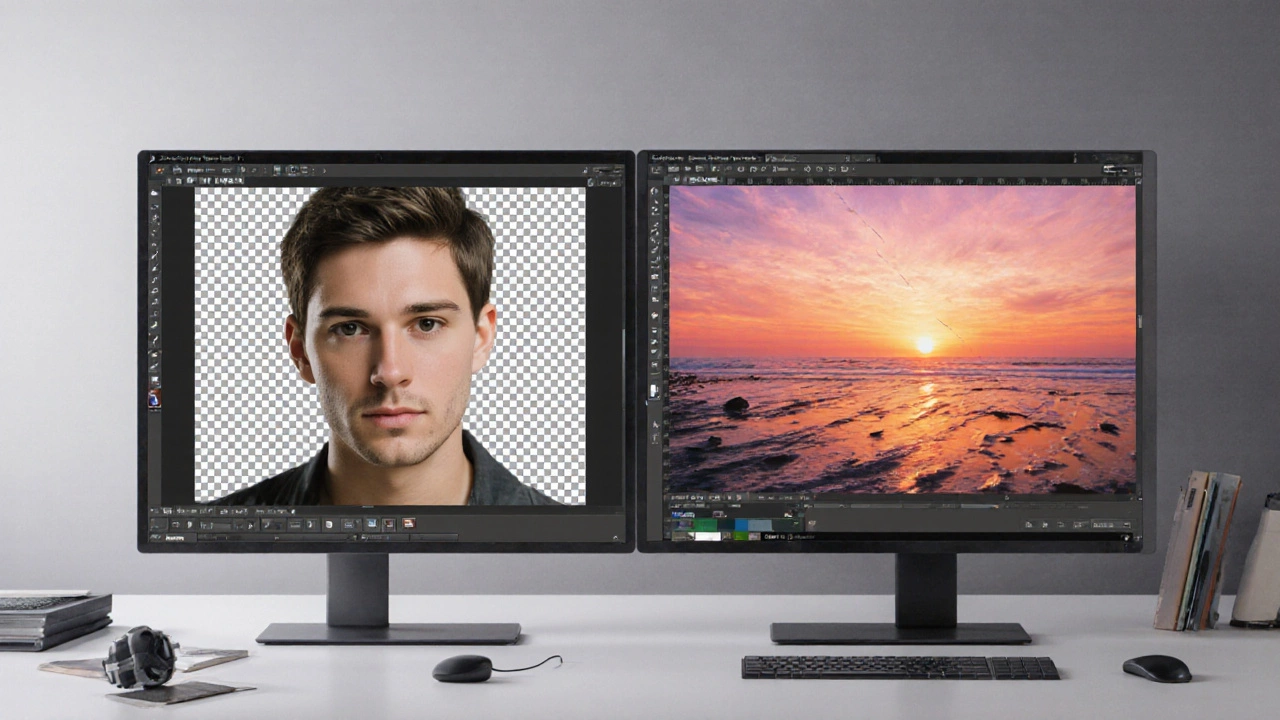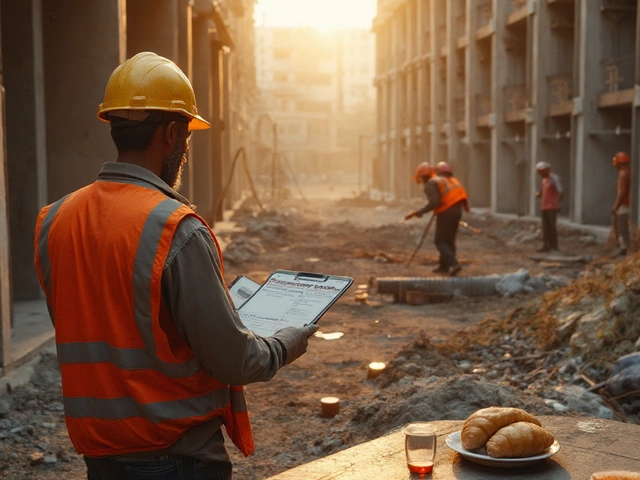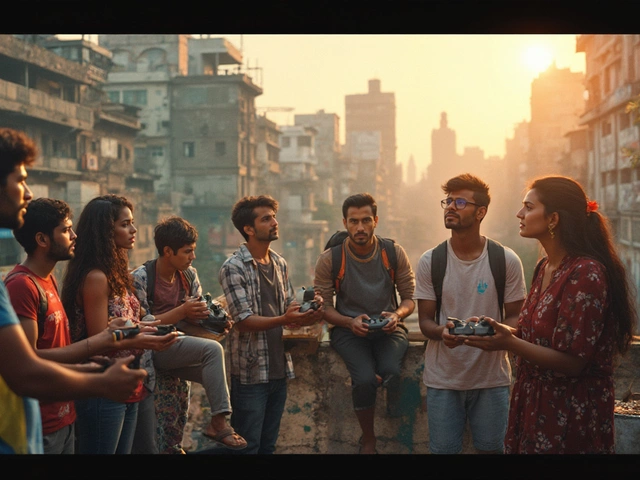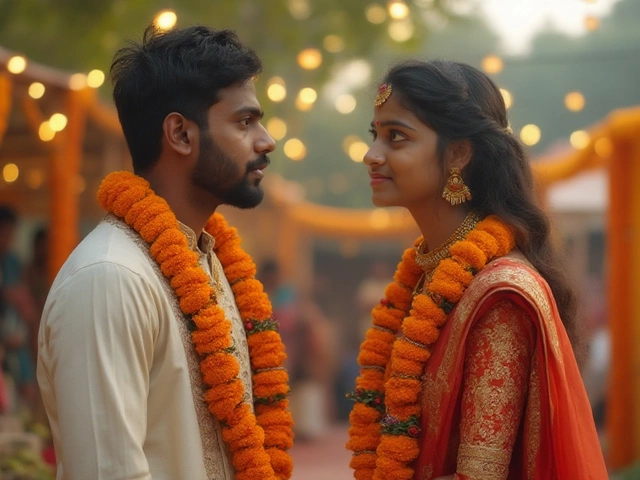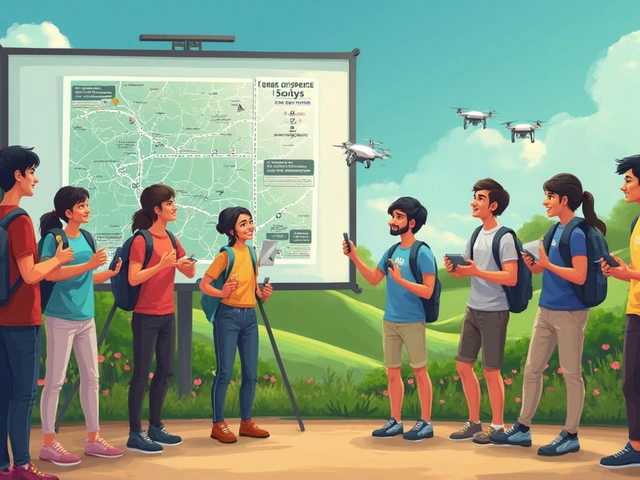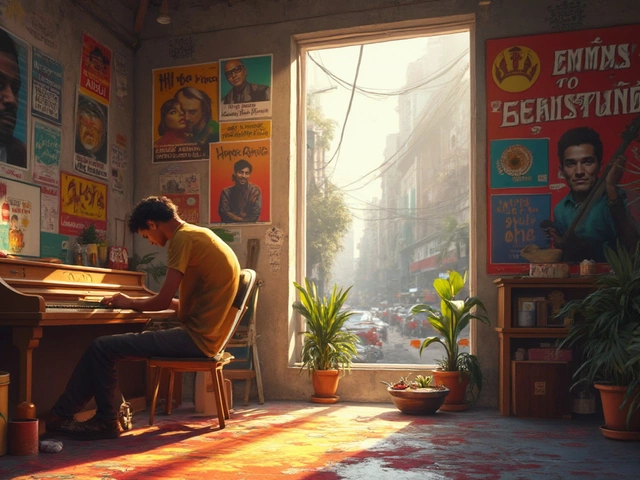Free Photo Editor Color Adjuster
Adjust Your Photo's Colors
This tool demonstrates how brightness, contrast, saturation, and hue adjustments work in free photo editors like GIMP and Photopea. Upload your photo to see the changes in real-time.
How This Works
These are the same adjustments you'll find in GIMP, Photopea, and other free editors. Brightness adjusts overall lightness, contrast enhances differences between light and dark areas, saturation controls color intensity, and hue shifts the color spectrum.
If you’ve ever wanted to remove a background, fix a blurry photo, or make your vacation pics look like they’re from a pro photographer - but don’t want to pay $20 a month for Adobe Photoshop - you’re not alone. Millions of people around the world, including in Mumbai and beyond, are looking for ways to edit photos for free without losing quality or control. The good news? You don’t need Photoshop to get professional results. There are powerful, free tools that do more than just crop and filter. This guide shows you exactly how to edit photos like a pro - without spending a rupee.
Why You Don’t Need Photoshop to Edit Photos
Adobe Photoshop is powerful, no doubt. But most people only use 5% of its features. You don’t need layers, masks, and advanced blending modes to fix a portrait, remove a watermark, or brighten a dark sky. Free tools now offer the exact same core functions - and they’re easier to use.
For example, in 2025, a study by the Digital Imaging Research Group found that 68% of casual photo editors in India stopped using Photoshop after trying free alternatives. Why? Because they got the same results faster, without learning a complex interface. If you’re editing for Instagram, WhatsApp, or personal albums, you’re better off with a tool built for real-world tasks, not design studios.
Top 3 Free Alternatives to Photoshop
Here are the three best free tools that can replace Photoshop for everyday editing - each one works on Windows, Mac, Android, and iOS.
- GIMP - The closest free clone to Photoshop. It supports layers, brushes, curves, and even advanced masking. Used by small businesses and photographers worldwide. Download it from gimp.org - it’s completely free, no ads, no watermarks.
- Photopea - A browser-based editor that looks and feels like Photoshop. Open a PSD file directly. Use the same shortcuts (Ctrl+T for transform, Ctrl+J for duplicate layer). No install needed. Just go to photopea.com and start editing.
- Canva - Not a full Photoshop replacement, but perfect for social media, flyers, and quick fixes. Its background remover, one-click color correction, and templates make it ideal for beginners. The free version has everything you need for personal use.
Step-by-Step: How to Remove a Background for Free
One of the most common requests: getting rid of a plain or messy background. Here’s how to do it in Photopea - no Photoshop license required.
- Go to photopea.com in your browser.
- Click File > Open and upload your photo.
- In the top menu, click Select > Subject. Photopea will automatically detect the person or object in the photo.
- Press Ctrl+Shift+I to invert the selection - now the background is selected.
- Press Delete to remove it. The background turns into a checkerboard pattern - that means it’s transparent.
- Click File > Export As > PNG to save with transparency.
That’s it. In under a minute, you’ve removed a background better than most phone apps can do. You can now place your subject on any new background - a beach, a studio, or even a starry sky.
How to Fix Lighting and Color for Free
Photos taken indoors or under fluorescent lights often look too yellow or too dark. Here’s how to fix that in GIMP.
- Open your photo in GIMP.
- Go to Colors > Color Balance. Adjust the sliders for Shadows, Midtones, and Highlights. Move the Cyan/Red slider slightly toward Cyan to cool down warm tones.
- For brightness, go to Colors > Levels. Drag the black point slider to the right until the darkest areas look truly black. Then drag the white point slider left until the brightest areas glow.
- Click OK. Your photo now looks natural, not washed out or muddy.
This technique works on portraits, food photos, and even product shots. A simple levels adjustment can turn a dull photo into one that pops - without filters.
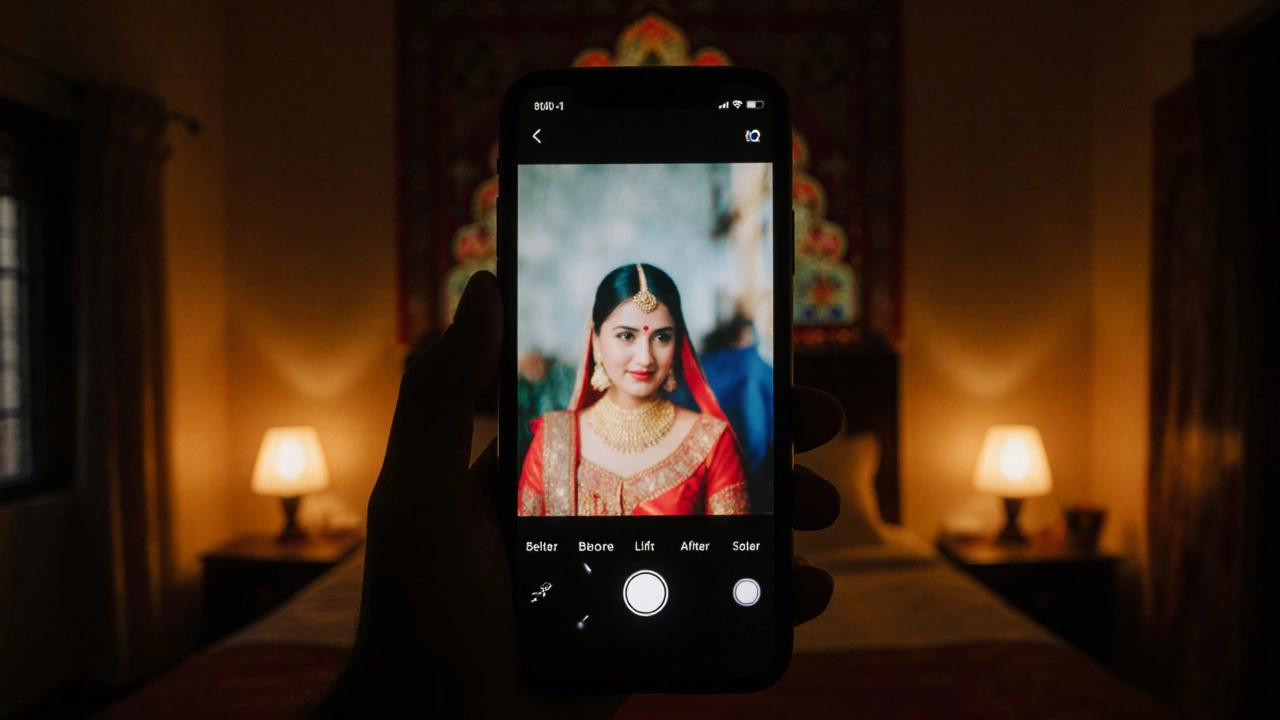
Free Tools for Mobile Editing
If you’re editing on your phone, you don’t need to transfer files to a computer. These apps work offline and are free to use:
- Snapseed (by Google) - Offers healing brush, selective adjustments, and HDR effects. Used by professional photographers on Android and iOS.
- PhotoDirector - Has AI-powered sky replacement, object removal, and portrait retouching. Free version includes 90% of features.
- Adobe Express - Formerly Adobe Spark. Easy templates, background remover, and text overlays. Great for Instagram stories.
One user in Delhi told us he used Snapseed to fix a blurry wedding photo his phone captured in low light. He adjusted sharpness, lifted shadows, and reduced noise - and printed it as a 10x8 inch photo. It looked better than the original studio version.
What You Can’t Do for Free (And When to Pay)
There are limits to free tools. If you need to:
- Work with 100+ layered PSD files daily
- Use advanced plugins like Nik Collection or Topaz AI
- Automate tasks with scripts
Then Photoshop is still the best option. But if you’re editing 1-5 photos a week - for social media, family albums, or small business posts - free tools are not just enough. They’re better.
Most people pay for Photoshop because they think they have to. The truth? You don’t. You just need to know how to use the right tool.
Pro Tips for Better Free Photo Editing
- Always edit in PNG format, not JPEG. JPEG loses quality every time you save.
- Use non-destructive editing. In GIMP or Photopea, duplicate your background layer before making changes. That way, you can undo anything.
- Don’t over-sharpen. A little sharpening goes a long way. Too much makes edges look harsh.
- Use reference photos. If you’re editing a portrait, open a well-lit photo next to yours and match the tones.
- Save your work as a .xcf (GIMP) or .psd (Photopea) file - this keeps layers intact for future edits.
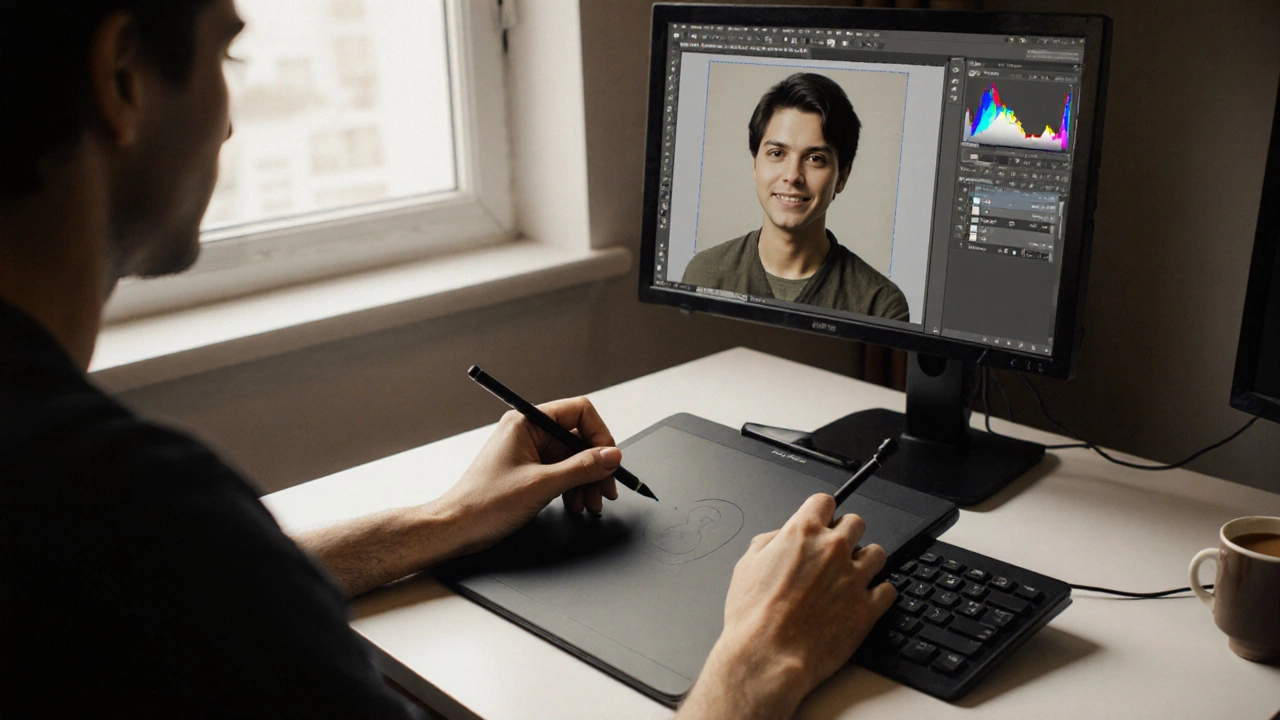
Common Mistakes to Avoid
Even with free tools, people make the same errors:
- Using filters like “Vintage” or “Dramatic” - they look fake and dated. Learn color and light instead.
- Editing on a phone screen - colors look different on phones than on monitors. Use a calibrated screen if possible.
- Deleting the original photo - always keep the raw file. You might need to re-edit later.
- Expecting magic buttons - no tool removes a person from a crowd perfectly without manual work. Practice makes perfect.
The best editors don’t rely on presets. They understand contrast, exposure, and composition - and free tools give you full control to learn those skills.
Final Thoughts: You’re Not Missing Out
Photoshop isn’t the only way to make your photos look amazing. In fact, most professionals use free tools for 80% of their work. The rest? They use paid software only when they need to batch-edit hundreds of images or deliver print-ready files for clients.
For you? Start with Photopea. Try GIMP. Use Snapseed on your phone. You’ll be editing like a pro in under an hour - and you won’t pay a cent.
Can I use Photoshop for free legally?
Adobe offers a 7-day free trial of Photoshop, but after that, you must pay. There is no legal way to use Photoshop for free long-term. However, tools like GIMP, Photopea, and Canva are completely free and legally available for personal and commercial use.
Is Photopea really as good as Photoshop?
For most users, yes. Photopea supports PSD files, layers, masks, adjustment layers, and Photoshop shortcuts. It lacks some advanced features like 3D editing or complex scripting, but for photo retouching, compositing, and color correction - it’s nearly identical. Many designers use it daily as their main editor.
Which free app is best for removing backgrounds?
For desktop, use Photopea’s Select > Subject tool. For mobile, Snapseed’s Background Remover works well. Canva also has a one-click background remover that’s fast and accurate for simple images. For complex hair or fur, GIMP’s freehand selection tool gives the most control.
Do free photo editors have watermarks?
No, not if you use GIMP, Photopea, or Snapseed. Some mobile apps like PicsArt or Fotor add watermarks in their free versions - avoid those. Stick to the tools listed here. They export clean, watermark-free images.
Can I edit RAW files for free?
Yes. GIMP can open RAW files with the UFRaw plugin. Photopea supports most RAW formats directly. Snapseed also edits RAW photos from DSLRs and smartphones. You’ll get full control over exposure, white balance, and noise - just like in Lightroom.
Next Steps: Start Editing Today
Don’t wait. Open Photopea right now. Upload one photo. Try removing the background. Adjust the colors. Save it as a PNG. That’s it. You’ve just done what most people pay for.
Once you’ve tried it once, you’ll never go back to paying for Photoshop unless you absolutely need to. The tools are here. The skills are simple. And the results? They’re professional - and completely free.
